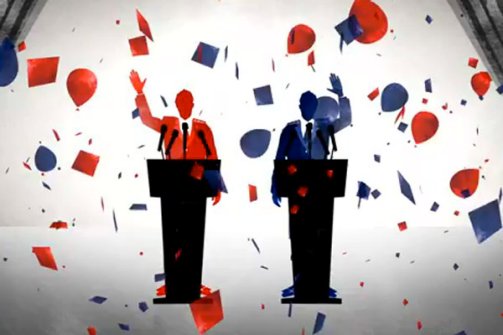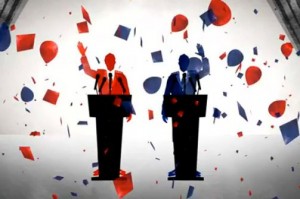Many Americans tired of long, harsh political process: Ex-US diplomat

 The low turnout in the 2012 US presidential election shows the fact that Americans are tired of the long and harsh political process involved in the presidential campaigns, says a former US assistant secretary of state.
The low turnout in the 2012 US presidential election shows the fact that Americans are tired of the long and harsh political process involved in the presidential campaigns, says a former US assistant secretary of state.
Press TV has conducted an interview with Richard William Murphy from New York City.
Murphy is joined by two additional guests on Press TV’s News Analysis program: James Jatras, former US Senate foreign policy analyst, Washington, and Jennifer Loewenstein with the University of Wisconsin from Madison. What follows is an approximate transcription of the interview.
Press TV: This time around interesting that fewer people voted this year than four years ago, of which in 2008 there was a peak of about 131 million but this year 117 million, taking into consideration with 95 percent of the precincts reporting, and also putting that with the twenty four million registrations, which contain significant errors, we are looking at a number that could be below 100 million thus that attributes to 50 percent or less.
Why do you think fewer voters came out this time around?
Murphy: Well, I think that the campaign was long. The campaign was pretty harsh in its rhetoric: Republican versus Democrat. And many people got tired of the politics involved.
That said, both parties worked very hard to organize voters at the grassroots level to make sure that they got them to the polls yesterday and of course in some cases they came as much as a week or two in advance [for] early registration.
…I would not see any great problem with the difference between 2008 and 2012.
There was a lack of excitement about the Obama candidacy but that reminds us that we put so many hopes on really the unknown figure of Barack Obama four years ago.
He said that he could transform the scene domestically and make a new bid for America’s role internationally and inevitably there have been disappointments and some disenchantments but what the Republicans did not do was appeal to change the American landscape.
The different ethnic bloc votes, be they Latinos, be they black Americans, and the Democrats did a much better job at making their party more appealing than the Republicans.
Press TV: You talked about disappointments and disenchantments, if you can tell us what you would say are disappointments and disenchantments when it comes to Barack Obama in the past four years?
Murphy: Well, I think that in the domestic field that he has not magically restored the health of the American economy.
He has stressed throughout the campaign that he started with a very difficult task, inherited from the events of the Bush administration.
The Republicans said yes, you had a difficult task but you made it worse! I mean that is American politics talking. The economy has started to recover but it was not an overwhelmingly dramatic recovery. It looks as if we have turned the corner in terms of avoiding a deep recession but there are a lot of people still without jobs and they have made their voices heard in this campaign.
Press TV: This Fiscal Cliff is coming up, of course a deadline to agree new legislation that could make or break, not just US’ economic recovery but in some respects it is said the global recovery of the entire world.
Where do you see that going? Is that going to be resolved? Are we going to see that bickering last time around that we saw going up to the, practically, second of it being approved for an increase in the debt ceiling?
Murphy: I think that President Obama has set a sharp reminder that he has to do better at reaching out to the Republicans in Congress if his overall plan for recovery is going to have any chance of success.
He tended in the first term to rely on the congressional leadership to carry the ball on very difficult problems such as the revision of the healthcare system, not intervening himself until quite late in the process.
There is a need for strong leadership from the White House to bring both Republicans and hesitant Democrats onboard with the recovery programs, but everyone knows that some very tough decisions need to be taken in the next few months to avoid falling off that fiscal cliff.
Press TV: Same question to you Richard Murphy? [We saw that for example when it comes to Israel, it appeared anyways that Israel was behind Romney and some reports indicate that it was Obama who stopped Israel from, for example, attacking Iran. Do you see any changes of Obama regarding the Middle East or what is your idea about he is going to, for example, tackle what he seems to think is Iran’s pursuit of nuclear weapons, as he claims Iran is doing?]
Murphy: I am not as pessimistic. I see for instance in the case of Syria a new appraisal of what may be needed to bring about a better situation in Syria. We have to find a way to bring the Russians and the Chinese into the effort and there has been, I think, a discernible softening of the tone of the criticisms coming from Washington, about Moscow in particular, and now we see the… Russian Foreign Minister Lavrov traveling to Cairo, to Amman and saying that there must be a way to get a political dialogue going.
President Obama did say as long ago as August of last year that Bashar al-Assad should step aside. There was never a clear plan as to how to bring that about and it is only going to be the results of a political negotiation that will bring that about, barring some domestic act of violence against the president in Syria itself.
So now it is a matter of intensifying the dialogue between the opposition elements who have been very disunited, fragmented, in Syria, which is not a new situation. They have never had made a great display of political opposition over the decades. They have never come together with a coherent opposition platform in Syria.
Now that is where the American effort has been focused for the last several months, trying to get them to talk together to come up with a cohesive platform.
You are going to see more of that. What that will mean in terms of involvement of Iran remains to be seen. Hillary Clinton said some months ago that Iran is part of the problem, not part of the solution. I have always thought if you have got a problem, those who are involved in the problem are going to be part of the solution but be that as it may I think the situation is more fluid and I am not that pessimistic.
Press TV: And on Iran in general?
Murphy: Well, in general I am hoping that these rumors of a dialogue and that something has been going on bilaterally between Tehran and Washington prove to be true but if so, it has been a very close-held, confidential approach, which I approve of because I do not think anything is going to be accomplished in the full spotlight of the United Nations or within larger groups.
There has to be progress bilaterally, very privately, and the rumors that came out just before the election that there were indeed some contacts… let us see, let’s hope that that will prove the road to a political, diplomatic improvement in the situation between Tehran and Washington, a long sought goal by many of us and a very discouraging progress over the last thirty years.







